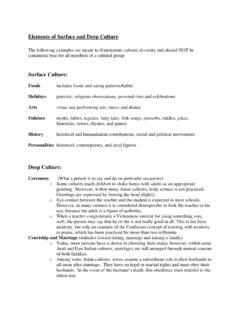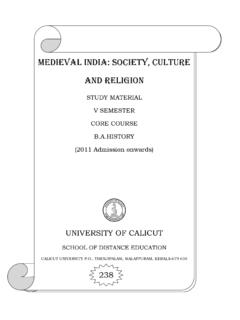Transcription of Culture and Development - MDG Fund
1 MDG-F Thematic Studies Culture and Development Review of MDG-F Joint Programmes Key Findings and Achievements. Culture and Development MDG-F Thematic Study: Review of Key Findings and Achievements Author: Jordi Balt Portol s. All rights reserved. No part of this publication may be reproduced, stored or transmitted in any forms or by any means, electronic, mechanical, photocopying, recording or otherwise, without prior permission. This report is an independent publication commissioned by the MDG Achievement Fund. The analysis and policy recommendations of the report do not necessarily reflect the views of the MDG Achievement Fund or the United Nations Development Programme.
2 Culture and Development - MDG-F Thematic Study Page 2. Contents I. Executive summary 4. II. Background 8. Context 8. Thematic background: Culture and international Development 9. The Thematic Window on Culture and Development 12. Aims and methodology of this study 15. Beneficiaries Diverse range of contexts and approaches III. Achievements and key results 17. Strategies aimed at poverty reduction 18. Support to productive capacity in the cultural industries and related sectors 18. Strengthening of institutions and policies Strengthening productive capacity and access to the market Empowerment of women through the broadening of social, economic and civic opportunities Enhancement of cultural heritage and Development of cultural tourism strategies 23.
3 Enhancement of cultural heritage Pilot projects in cultural tourism Access to and improvement of education 25. Development of the knowledge base on Culture and education Introduction of new policies, approaches and tools to foster access to education Promotion of intercultural values in education Access to and improvement of health 27. Development of the knowledge base on Culture and health Introduction of culturally-adapted methods and tools in the field of health Contribution to environmental sustainability 30. Joint promotion of cultural and natural assets Preservation of natural species through cultural awareness-raising Development and strengthening of cultural capacity 31.
4 Enhancement of the knowledge base Mapping exercises and other participatory techniques Awareness-raising on the place of Culture in Development Development and adaptation of legislation and policies More sophisticated cultural governance and policy Strengthened leadership capacities Capacity- and institution-building of community-based organisations (CBOs). Design of new academic and vocational training programmes Improvement of local cultural infrastructure Broader governance developments 42. Contribution to major national objectives Contribution to decentralisation processes Integration of a gender perspective in the institutional and political context Enhancement of the knowledge base and awareness-raising activities Culture and Development - MDG-F Thematic Study Page 3.
5 IV. Conclusion 45. Sustainability 45. JPs' legacy in the form of new framework programmes Institutional integration of processes and products Improved knowledge base Sustainability through branding and visibility Ownership and participation contributing to sustainability Evaluation and the advanced planning of sustainability Capacity- and institution-building Awareness-raising The limits of sustainability Replicability 49. IV. 3. Lessons learned 50. Lessons learned as regards programme design Lessons learned as regards the cultural dimension Lessons learned as regards poverty reduction and Culture Lessons learned as regards programme governance Lessons learned as regards awareness-raising Lessons learned as regards monitoring and evaluation V.
6 Recommendations 53. Enabling environment 53. Tackling cultural aspects 53. Knowledge sharing and advocacy in international forums 54. Annex 1: List of references and information sources 56. Annex 2: Aims and methodology of the study 61. Culture and Development - MDG-F Thematic Study Page 4. I. Executive summary Background 1. This thematic study aims to capture the main achievements of the 18 Joint Programmes (JPs). funded under the Thematic Window on Culture and Development of the UNDP-Spain MDG. Achievement Fund (MDG-F). The MDG-F is the result of a major partnership signed in December 2006 by the United Nations Development Programme (UNDP) and the Government of Spain, with the aim of contributing to progress on the Millennium Development Goals (MDGs), the internationally- agreed objectives in the field of Development which have, since 2000, galvanised international efforts to meet the needs of the world's poorest.
7 The MDG-F was initially provided with a contribution of 528. million (USD 710 million), which increased by 90 million (USD 121 million) in 2008. Even though cultural aspects are not explicitly referred to within the MDGs, the last decade has witnessed an increasing recognition of the links between cultural aspects and human Development . The connection between Culture and Development was made explicit in the Outcome Document of the MDG Review Summit held at the UN General Assembly in September 2010, as well as two other recent resolutions. Other international milestones in recent years include a number of legal documents (including UNESCO's 2003 Convention for the Safeguarding of the Intangible Cultural Heritage and 2005 Convention on the Protection and Promotion of the Diversity of Cultural Expressions) and major international reports (including the 2004 edition of UNDP's Human Development Report, entitled Cultural Liberty in Today's Diverse World, and the two UNCTAD / UNDP.)
8 Creative Economy Reports published in 2008 and 2010), as well as policies, programmes and publications designed by several local, regional and national governments, Development agencies, regional and international organisations and NGOs. The 18 JPs funded under the MDG-F's Thematic Window on Culture and Development stand as a substantial contribution to this area, taking account of the financial resources provided and the innovative and diverse approaches implemented. The main arguments given for the affirmation of the place of Culture in human and sustainable Development are twofold. On the one hand, Culture is seen as a resource to achieve international Development objectives in other fields of human activity, including the alleviation of poverty and social exclusion, the promotion of health and education and the preservation of the environment.
9 On the other hand, Culture is also affirmed as a substantial component of human and sustainable Development , rather than merely existing as a tool for the 2. achievement of results in other fields. Activities supported under the Thematic Window's 18 JPs, which are diverse in terms of the countries where they have been implemented, the topics addressed and the achievements sought, attest to both these perspectives. Achievements and key results 1. In the UN context, a Joint Programme (JP) is a programme involving two or more agencies, resulting from a joint programming process. Within the context of approved agency country programmes and signed agreements, a JP is outlined in a single document, which describes the linkages between and responsibilities of all participating agencies.
10 Different funding mechanisms can be adopted. The use of JPs has been fostered in recent years. For additional information, visit [Last visit: 28/11/2012]. 2. See Section for more detailed information about these arguments and additional references. Culture and Development - MDG-F Thematic Study Page 5. On the basis of the evidence collected, the study identifies six thematic areas of impact, some of which can directly be related to MDGs (poverty reduction, education, health, environment) and others which can be seen as key factors in the achievement of the MDGs and which can simultaneously be related to several MDGs ( Development and strengthening of cultural capacity, and contribution to governance and policy-making).








